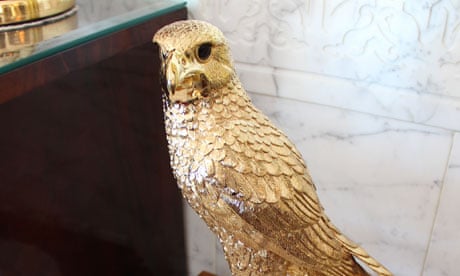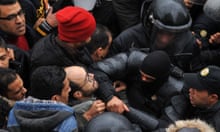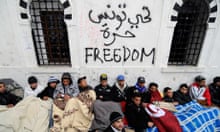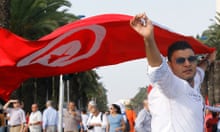Ever wanted to recreate the lifestyle of an authoritarian despot but weren't sure how? Now is your chance. In what is billed as a "sale of ill-gotten gains", Tunisia's finance ministry is seeking to ease its stretched current account by selling off cars, jewellery, furniture, pictures and assorted bling confiscated from the deposed president Zine al-Abidine Ben Ali and his family.
Heavy security is in place around the Cleopatre exhibition space in Gammarth, a wealthy resort north of Tunis, for the opening on Saturday of a display of sale items including 34 luxury cars – semi-armoured Cadillac limousines, BMWs, Mercedes, two Lamborghini Gallardos, Bentleys, Aston Martins – and some 300 pieces of jewellery. Among the paintings, clothes, furniture and knick-knacks on show, the prevalence of gilded falcons and swallows in flight perhaps betrays the taste of the former first lady Leila Trabelsi, Tunisians speculate.
Cash dispensers and currency exchange desks stand at the ready. Smaller items will be sold at a fixed price, while anything priced at more than £4,000 will go to the highest bidder. Many pieces come from the Ben Ali family's sumptuous palace with a Mediterranean view at nearby Sidi Dhrif. The residence is itself now topping Tunis estate agents' lists as the authorities seek a wealthy Gulf buyer.
During the revolution that sparked the Arab spring two years ago, villas in Gammarth abandoned in haste by other members of the Ben Ali circle were looted, but the items on display there now came into public hands through the courts. The bling is just the most colourful part of a sell-off that includes confiscated shareholdings in a bank, two car importers and a cement plant. As Tunisians face up to the fact that their country is rather poorer than Ben Ali had them believe, the authorities have emphasised that the 20m dinars (£8m) they hope to raise from the Gammarth sale will go towards school buses for rural children and new roads.
The organisers evidently hope to attract not just well-heeled but public-spirited buyers looking for that special gift with a story behind it, but also members of the public ready to pay the 30 dinar entrance ticket to marvel at their former ruler's nouveau-riche excesses.
Times are hard for many this winter, however. Protests in poorer regions continue to discourage investment, taking unemployment to new highs in some towns and adding weight to arguments that the Islamist-led government lacks economic expertise. A shortage of milk in supermarkets is adding to the sombre public mood; parents of small children solicit tips as to which corner shops are handing out imported milk from under the counter.
The government has just announced a new finance minister, Elyes Fakhfakh of the centre-left Ettakatol party. His predecessor resigned last summer, claiming that spending on jobseekers' allowances and work schemes, and planned compensation payments to former political prisoners, would be unsustainable.
The finance ministry also said on Thursday that to make ends meet in 2014 it may have to resort to a $2.5bn (£1.5bn) credit line from the IMF.
This year's total budget of £10.6bn includes financial help from well-wishers including the World Bank, the EU, Qatar, and neighbouring Libya (which praised the generosity Tunisians showed towards refugees from the war there last year).
Ben Ali, Trabelsi and the couple's young son begin their third year of exile in Saudi Arabia in January. The Saudi government has declined to extradite them to Tunisia, where they have been convicted in absentia on charges including misuse of state funds. A once-favoured son-in-law, the 31-year-old Sakhr al-Materi (husband of Ben Ali's daughter Nesrine from a previous marriage), was questioned on 14 December at the airport in the Seychelles, after leaving his previous safe haven, Qatar. The Seychelles authorities later said he had left their territory. A Ben Ali brother-in-law and former kingpin of the Tunisian business world, Belhassen Trabelsi, is meanwhile wintering with his family in Canada, where he has applied for political asylum.











Comments (…)
Sign in or create your Guardian account to join the discussion